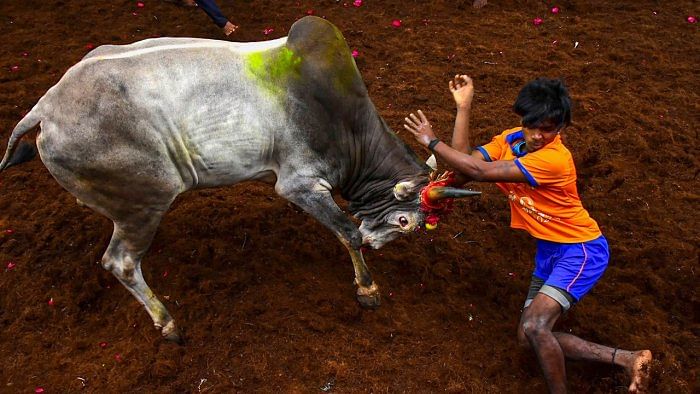
On May 18, 2023, the Supreme Court of India legitimised the practice of Jallikattu in Tamil Nadu. After the 2014 ban on Jallikattu by the SC on the ground that it involves the infliction of severe pain, suffering, and harassment on the bulls, the state of Tamil Nadu enacted the Prevention of Cruelty to Animals (Tamil Nadu Amendment) Act, 2017 and the Tamil Nadu Prevention of Cruelty to Animals (Conduct of Jallikattu) Rules, 2017, which seek to regulate the manner in which Jallikattu is conducted by minimising the pain and suffering on these bulls. The amended act defined Jallikattu as an event involving bulls with a view to following tradition and culture.
Also Read | All you need to know about 'Jallikattu' issue
At this juncture, the debate boils down to one question: Is following the tradition and culture of a community more important than the life and rights of an animal? The rights of an animal are governed by the Prevention of Cruelty to Animals (PCA) Act, 1960, whereas the cultural rights of a community are governed by Article 29(1) of the Indian Constitution.
The PCA Act aims to prevent the infliction of unnecessary pain or suffering on animals. Article 29(1), on the other hand, states that citizens have a fundamental right to conserve their culture. In the case of Jagdev Singh Sidhanti vs. Pratap Singh Daulta, the SC held that Article 29(1) is an absolute right with no reasonable restrictions, unlike Articles 19, 21, or 25.
However, what it does not clarify is whether this conservation can come at the cost of injury or death to another life. Hypothetically, if the practice of Sati was claimed by a community as a matter of cultural right, it would result in an unconditional human rights violation. This leads us to the question of where the life of an animal stands in the socio-cultural practices of a community. Why is an exception made in the case of Jallikattu, where severe abuse, pain, and suffering are inflicted on the bulls, to promote tradition and culture?
It is important to understand the purport and extent of Article 29(1) to determine whether Article 29(1) conserves every cultural practise irrespective of whether it causes harm to other beings or whether it is limited to only those harmless cultural practices of a community. To answer this question, it is important to look into why the Constitution chose to preserve the culture of a community.
India’s Constituent Assembly felt the need to preserve cultural differences in India, the absence of which would lead to the creation of a majoritarian State. Cultural conservation provided its citizens with social freedom and eliminated the vestiges of India’s colonial past. However, when the Constitution abolished practices like untouchability, it thwarted cultural claims. Thus, the Constituent Assembly was endowed with the responsibility of finely balancing harmless cultural claims with harmful cultural claims. Harmful cultural claims impinging upon rights guaranteed to others had no place for protection or conservation.
In cases like Jallikattu, where the victims are voiceless, it is the SC’s responsibility to prioritise beneficial legislation like the PCA Act over a harmful fundamental right. However, this does not mean that animals must be absolutely protected from the infliction of all pain and suffering. The PCA Act provides several provisions where animals must inevitably be used for human benefit. For example, for the purposes of advancing human knowledge, using them for farming, transporting loads, and using them for food. However, Jallikattu does not do any of this. On the contrary, as reported in the media, several people have been gored by the bulls and died during Jallikattu. The traditional sport of Jallikattu inflicts more harm than good.
In such instances, it becomes crucial for the judiciary to take a stance in favour of the voiceless and avoid traditions and cultural practices that favour no one, not even the community. Even the argument that Jallikattu must be allowed as entertainment is weak for three reasons: the entertainment is harmful for the well-being of bulls and humans; the PCA Act does not permit cruel treatment of animals solely to provide entertainment; and it is the fundamental duty of every citizen of India to have compassion for living creatures.
(The writer is a final-year student at Ramaiah College of Law, Bengaluru.)